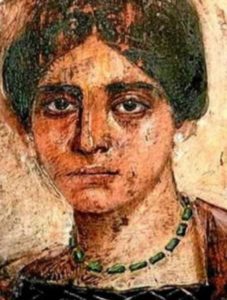
Passion (Palm) Sunday is the day on which we celebrate and remember Christ’s triumphant entry into Jerusalem on a donkey. He was honored as a king while palm branches and olive branches were waved before him. The crowds were excited and shouted, “Hosanna!” How did we learn about this procession?
Some research on the web revealed some interesting, and perhaps, little-known information about a fourth-century woman named Egeria. Egeria is described by some as a widow and a Roman convert to Christianity who was a member of the upper class. Other writers hold that she was a member of a religious community. It is said that she wrote notes about her pilgrimage to many biblical sites and sent these notes to sisters in northwestern Spain. Her pilgrimage took place in the years 381 to 384. She is likely one of the first Christian female pilgrims to write about her experiences. After scanning the internet, I also reached out to my cousin, Fr. Dominic Serra, who provided me with pages of information from a book by the Belgian Benedictine scholar, Adrian Nocent, (d. 1996) cited below.

Egeria’s description of the way Palm Sunday was celebrated in Jerusalem, while she was there follows:
"As the eleventh hour [five o’clock in the afternoon] draws near, that particular passage from Scripture is read in which the children bearing palms and branches came forth to meet the Lord [Matthew 20] saying: ‘Blessed is He who comes in the name of the Lord.’ The bishop and all the people rise immediately, and then everyone walks down from the top of the Mount of Olives, with the people preceding the bishop and responding continually with ‘Blessed is He who comes in the name of the Lord’ to the hymns and antiphons. All the children who are present—including those who are not able to walk because they are too young and therefore are carried on their parents’ shoulders—all of them bear branches, some carrying palms, others, olive branches. And the bishop is led in the same manner as the Lord once was led. From the top of the mountain as far as the city, and from there through the entire city as far as the Anastasis, everyone accompanies the bishop on foot, and this includes distinguished ladies and men of consequence, reciting the responses all the while; and they move very slowly so that the people will not tire. By the time they arrive at the Anastasis, it is already evening. Once they have arrived there, although it is evening, vespers are celebrated; then a prayer is said at the cross and the people are dismissed."
(Nocent, 2014, pp. 187-188)
"The oldest Roman tradition makes the Sunday before Easter a day for commemorating the Passion of the Lord. In the second half of the seventh century, the name Passion Sunday was transferred to the fifth Sunday of Lent, previously known as “Lazarus Sunday,” and the sixth Sunday came to be called “Palm Sunday” in the seventh and eighth centuries. The recent reform has changed the first five Sundays of Lent once again into a continuous preparation for the Paschal Mystery of Christ’s death and Resurrection [and] Palm Sunday has become again the Sunday of the Passion reading that points ahead to the Resurrection."
(Nocent, 2014, pp. 190-191)
Nocent, Adrian, O.S.B. (2014). The Liturgical Year Volume 2: Lent, the Sacred Paschal Triduum, Easter Time. Matthew J. O’Connell (trans.). Collegeville, Minnesota: Liturgical Press.
Fast forward to 2023, for your reflection on the events of Palm Sunday:
Where do you find yourself in the crowd?
This is the one who performed miracles and asked for nothing in return. Are you praising this man while waving palms and olive branches and singing Hosanna?
Are you like the Pharisees, hiding in the crowd, suspicious and afraid of the influence of this man? Sometimes, we are fearful about what might happen if we allow Christ to enter our lives fully. What will we have to leave behind or change?
Are you like the disciples, wondering why this man who can calm the waves and feed five thousand chooses not to calm the chaos around us?
And what of Christ? Being God and human, he knew that after this show of adoration, a torturous end awaited Him. What is our attitude toward whatever is facing us? Are we afraid? What might help us to prepare?
Where is the Paschal Mystery inviting us to travel, to be a pilgrim like Egeria?
As Lent ends, let us keep our hearts soft and filled with hope, our stance merciful and compassionate, and our spirits in eager, joyful anticipation of the Resurrection.
– Sister Amelia DeMarco, OP
Sister Amelia, Clinical Psychologist, and retired educator from St. Thomas Aquinas College now shares the Word through blogging.
